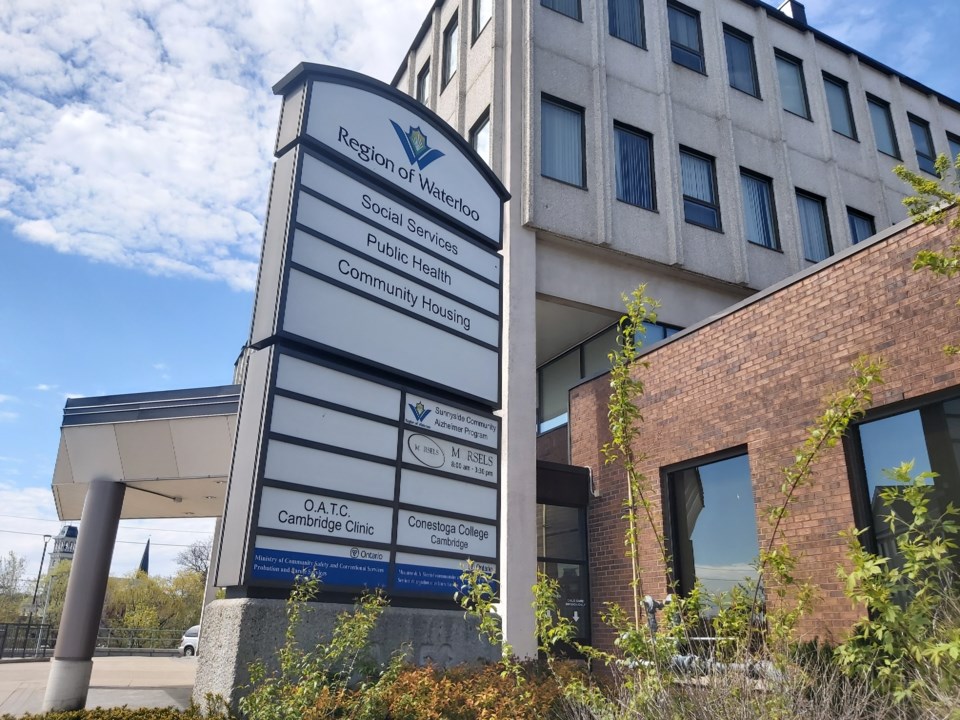A request for $10,000 in “emergency bridge funding” from the agency running Cambridge’s first drop-in space for people experiencing homelessness and addiction prompted some city councillors to question why demand for harm reduction services in the city isn’t being met by the region and the province.
On Tuesday, Cambridge council eventually approved the one-time grant to the AIDS Committee of Cambridge, Kitchener-Waterloo, and Area (ACCKWA) on the recommendation of the city’s grants to groups committee, but not before criticizing upper levels of government for not meeting their needs.
“Where is your ask for the region and public health since we don’t do this?,” questioned Coun. Jan Liggett, one of three councillors to push back against the request she and others don’t feel is within the municipality’s “sphere of jurisdiction.”
ACCKWA runs a Multi-Agency Community Space (MACS) out of the region’s Public Health and Social Services building at 150 Main St. in downtown Galt.
The hub offers anyone that comes through their doors access to food security programs, a housing list, emergency shelter, primary health care, and harm reduction supplies for unhoused individuals in Cambridge.
ACCKWA also provides outreach to encampments, executive director Ruth Cameron told council, which have grown by 50 per cent since the start of the pandemic.
Harm reduction outreach workers who go to encampments, provide water and harm reduction support, while trying to convince individuals they would benefit from going to hub. From there, they're able to form connections so referrals can be made to a range of services including basic needs supports.
But it’s the 1,303 user interactions a month at 150 Main where the need for funding lies, specifically in helping staff deal with overdoses on the property.
“We are dealing with overdoses on the site," Cameron said. "And typically we may see three to eight a month on that site.”
The impact on the workers monitoring the property has been overwhelming, she added.
“People are significantly burnt out and traumatized responding to overdoses on a regular basis. They are losing people that they know well."
She said the impact is similar to what is being experienced with healthcare workers in hospitals.
The bridge funding will support casual and peer workers “dealing with an arising situation” that was not part of the original plan for the site.
"We are going to see another year over year increase in fatal overdoses in Waterloo Region," Cameron said.
It’s a problem exacerbated by a drug supply poisoned by fentanyl and the fact that Cambridge doesn’t have a consumption and treatment services site, she said.
Coun. Mike Devine said he thinks the problem isn’t adequately being addressed because of a duplication of services.
“We have a very severe issue of multi-organizations doing the same thing,” he said. “The region has to take a lead on this.”
But Cameron said they are in ongoing conversations with the Ministry of Health and the region about funding for Cambridge, which she called a desert for services actually needed on the ground.
There is "zero duplication" of services, she said. “I think this against the backdrop of fatal overdoses shows the need is incredibly high.”
"The suggestion that any one team could to this work, is unfortunately, unrealistic."
At the encampments, in addition to ensuring people aren’t suffering fatal overdoses from a poisoned drug supply, front line support workers are busy simply ensuring people have enough calories to sustain themselves so they don’t become septic.
They’re dealing with a population whose “mental health is so poor due to the poisoning of the drug supply and the severity of their overall health and well being,” that many are in psychosis, Cameron said.
In that environment, it takes time for workers to negotiate even simple services like wound care, but it’s critical “so they don’t escalate into even more severe situations.”
It's a “very intensive way of addressing needs” that will require additional resources, said the former army medic.
“The difference between us and a military response is we don’t have reinforcements,” Cameron said.
City chief financial officer Sheryl Ayres explained that when the request for $10,000 in operational and bridge funding came through to the grants to groups committee in late July, $65,200 had already been allocated from the $94,700 available this year.
The remaining balance of $29,500 is intended for emergency requests.
Knowing that, Ayres brought ACCKWA’s request to the committee, which recommended it to council.
“I still think the region needs to step up to the plate,” Liggett said, adding what troubles her the most is that every dollar taxed of Cambridge citizens, 90 cents goes to the region and the province.
“If you take policing for instance, we’re not even getting what we need now,” she said.
“It’s pretty heartbreaking the need that’s out there, but this isn’t the place for it.
"It’s not appropriate at all for the taxpayers of Cambridge to be paying for it.”



